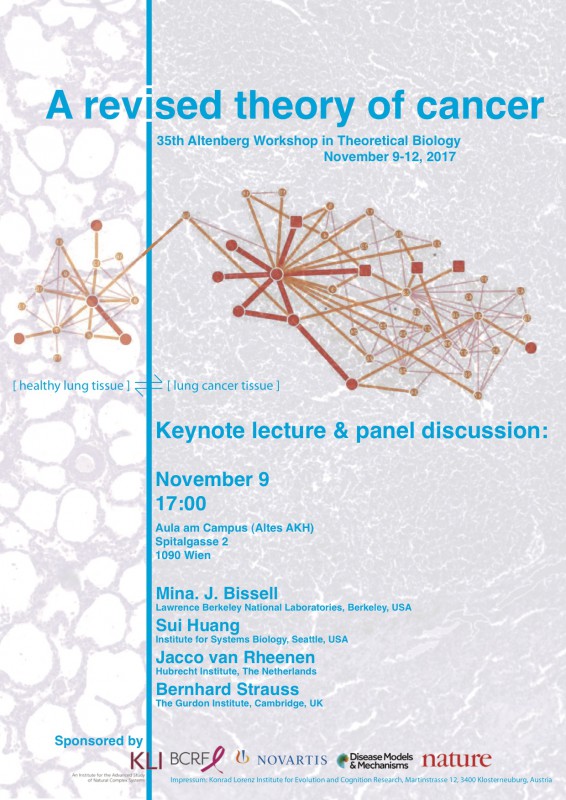News Details

Schedule
17:00 – 17:10 Gerd B Müller President of the Konrad Lorenz Institute for Evolution and Cognition Research, Klosterneuburg Welcome Address
17:10 – 17:30 Bernhard Strauss The Gurdon Institute, Cambridge, UK
17:30 – 18:10 Mina J Bissell Lawrence Berkeley National Laboratories, USA
18:10 – 18:20 Jacco van Rheenen The Hubrecht Institute, Utrecht, The Netherlands
18:20 – 18:30 Sui Huang Institute for Systems Biology, Seattle, USA
18:30 Panel discussion
19:00 Networking reception
Background:
The workshop organisers, Mina Bissell (Lawrence Berkeley National Laboratories, Berkeley, USA), Ingemar Ernberg (Karolinska Institute, Sweden), and Bernhard Strauss (The Gurdon Institute, University of Cambridge, UK) believe that it is high time that cancer researchers face up to some of the questions that concern many at a time of globally increasing cancer incidence. For example, why, since the sequencing of the human genome in the year 2000, there are still no reliable and robust therapies for most cancers, or why we are still waiting for the then expected breakthroughs in our mechanistic understanding of the disease. One reason for this situation is that on the whole cancer research is still applying a rather simplistic “cancer gene” concept that assumes a linear and direct causal relationship between certain mutations in “cancer” genes (or their respective suppressor genes) and the onset and progression of the disease. The more complete genomic data sets from tumour samples have accumulated though over the past decade, the more it seems – apart from very few exceptions - now unlikely that such simple, linear causal connections will emerge. Moreover, it appears ever more unlikely that such anticipated simple relationships will lead to robust treatment options.
At the same time, results in cancer cell biology have shown convincingly that mechanisms, such as the regulatory role of the extracellular matrix that surrounds a tumour tissue as well as epigenetic mechanisms (that change gene expression without a mutation in DNA sequence) play an essential role in cancer causation and progression. In addition, data collected over several decades by different groups show that tumour cells carrying a cancer mutation can revert to normal tissue cell behaviour when experimentally put back into a normal tissue environment. Moreover, the same large-scale genomics approaches that are still using the simple cancer gene causality framework have shown that in fact most healthy tissues carry cancer mutations without ever causing the disease.
These and other results from the past two decades have therefore shown that many of our “classic” ideas about cancer (mainly based on the “Somatic Mutation Theory of Cancer”) are by now simply out-dated. For example, a tumour is not a homogeneous mass of identical cells proliferating in an identically “malignant” way, but more an organ-like integrated cell community, containing mostly “normal” cells, however in an abnormal differentiation state. These cells have undergone a dynamic evolution within the tumour tissue leading to considerable tumour cell heterogeneity and complexity. Because cancer cells have lost the regulatory controls that would provide them with their specific tissue identity, they lose also their cell polarity, which defines the “top” and “bottom” of a cell, causing abnormal tissue organisation (as seen already in pre-neoplastic lesions). In this state of “confusion” cells show behaviours similar to their embryonal stage, and also produce an abnormal tissue context by secreting abnormal extracellular matrix. This de-differentiated tissue state then causes as a consequence also the accumulation of mutations. In this view of cancer initiation the causality relationship between genetic mutations in tumour cells and disease progression is turned on its head. This also means that we urgently need to understand the very early stages of the disease much better than we currently do.
Another example is metastasis. In recent years, it has been shown convincingly that metastasis is not the result of late stage tumours disseminating cells into the blood stream. On the contrary, metastasis is a very early event in tumorigenesis, and metastatic cells begin to colonize other tissues many years – often decades – before the primary tumour is diagnosed. This on the other hand means again that there must exist mechanisms at the tissue level that specifically and actively suppress malignant cell behaviour all the time to maintain normal tissue function.
However, the current explanatory paradigm in cancer research is strongly based on a bottom up approach that tries to explain and study cancer from the perspective of a single malignant cancer cell carrying a single cancer mutation (or a low number thereof). As a consequence there is currently only incomplete understanding of how tissue level mechanisms that act in a regulatory fashion within larger communities of cells might work. To understand these mechanisms is important however as it is expected that they will be at the basis of new approaches in cancer prevention and therapy.
The workshop is anticipated to start the process of integrating these and other recent insights into a new framework of “a revised theory of cancer.”

